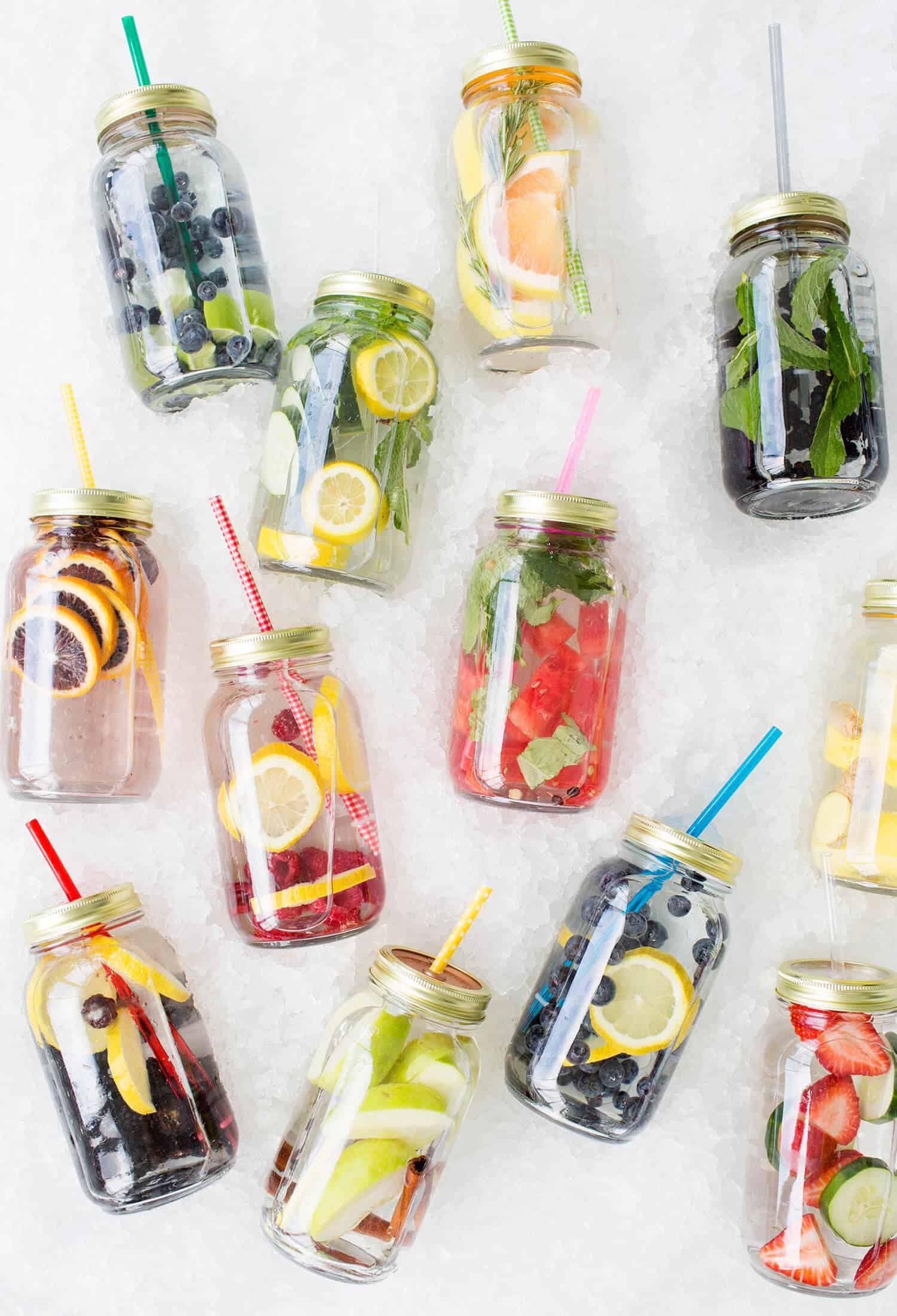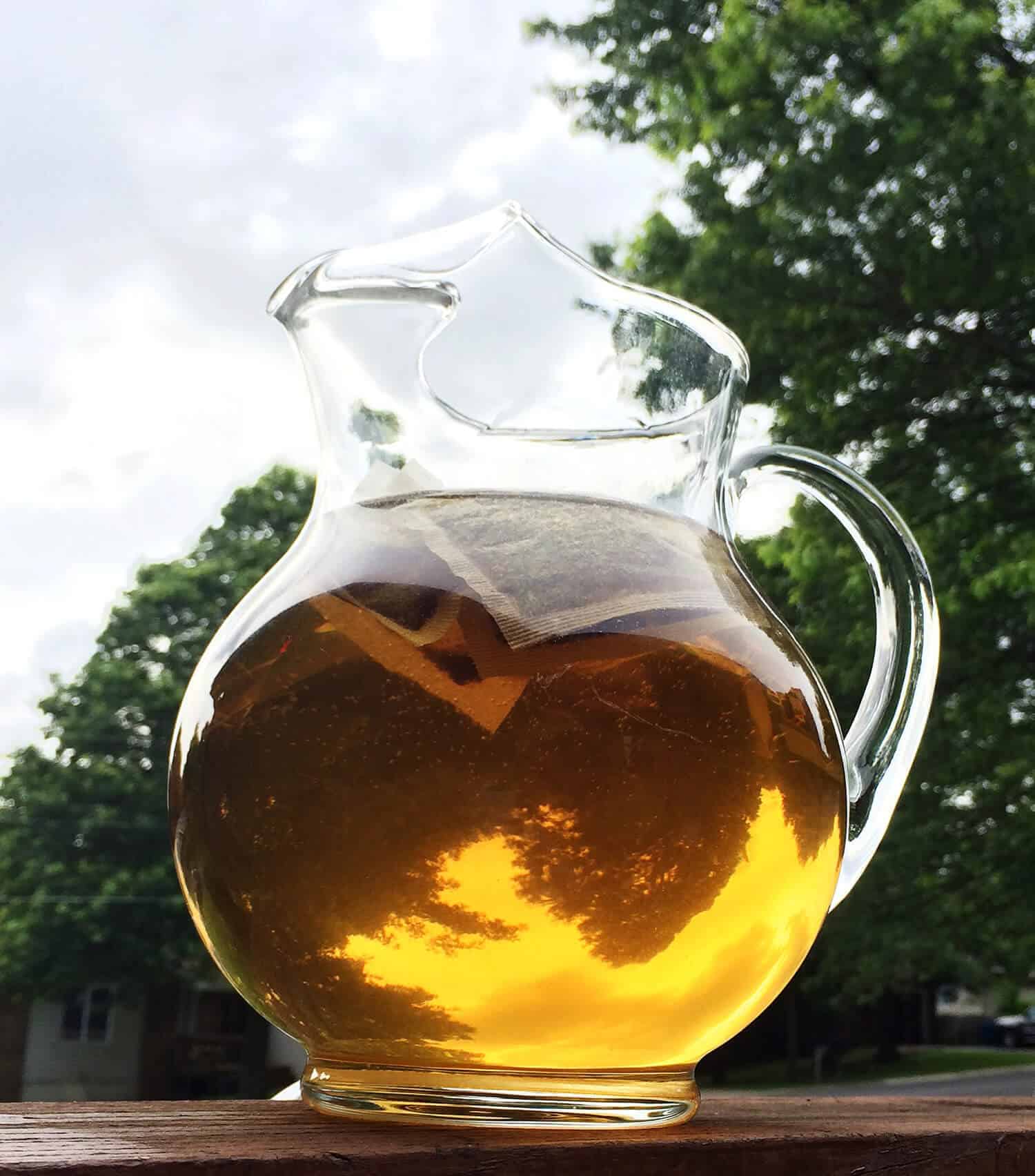 We’re SO excited to start a mini series here on the blog today with the two dietitians we worked with on our cookbook, Weekday Weekend. Sarah and Lindsey are both registered dietitians located in Springfield, MO. And in addition to hearing from them in the cookbook, we wanted to add a feature where they could share their nutritional knowledge with us here on A Beautiful Mess. You can read a little more about them on our About page. And today we’re gonna hear from Sarah about WATER:
We’re SO excited to start a mini series here on the blog today with the two dietitians we worked with on our cookbook, Weekday Weekend. Sarah and Lindsey are both registered dietitians located in Springfield, MO. And in addition to hearing from them in the cookbook, we wanted to add a feature where they could share their nutritional knowledge with us here on A Beautiful Mess. You can read a little more about them on our About page. And today we’re gonna hear from Sarah about WATER:
Way back in elementary school, I learned that we need eight glasses of water a day to stay healthy and hydrated. Flash-forward several years, I found myself surviving on a diet of coffee alone when pulling all-nighters at college, and then again a couple years later when welcoming precious, sleep-stealing newborns. However, I survived. So what’s all the fuss about water? Furthermore, does this whole “rule of eight glasses” apply to everyone? No better time to discuss these facts than now, as we trudge through the long, hot remaining weeks of summer.
Water does so, so many important and fascinating things for our bodies. At a cellular level, water is used in temperature regulation for our organs and tissues while also aiding in the transportation of nutrients all throughout your body. Even more, drinking enough water helps promote regular bowel function while also keeping your skin healthy and glowing. Inadequate water intake can cause fatigue, dry skin, headaches, confusion and dizziness, to name just a few. According to the NIH, signs of dehydration can include oliguria (aka, decreased urine output), sunken eyes, rapid heartbeat and shriveled skin.
So how much water do we really need? As an RD I get a little frustrated with this “8 cups for all” rule, because I think it creates room for confusion and misconception. What’s funny, this whole “rule of 8” seemingly is the result of a long, drawn out game of telephone. In 1945, the Food and Nutrition Board of the National Research council released an article saying the average adult needed about 2.5 liters of water each day. Read more here, but the original publication definitely noted “most of its quantity will come from prepared foods.” Because we seem to enjoy making our lives difficult, somewhere over the years we decided to omit the part about “food” sources of water, which created this snowball effect of us thinking we need to drink all the water in the world to be beautiful, brilliant, healthy, glowing and perfect.
I digress. As dietitians, we are taught to be as precise as possible when determining an individual’s fluid needs. Holliday-Segar is a common equation we rely on but you’ll definitely need a calculator. Please save yourself the time and trouble because this kind of intense number crunching really isn’t necessary for normal, healthy adults.** Ever heard of insensible fluid losses? Unlike urine (and other bodily processes we won’t name) insensible fluid losses cannot be measured. Think losses from crazy processes like respiration, digestion and sweating … these losses make it impossible to throw blanket recommendations out there, as hydration is simply a measure of balancing the in’s and the out’s.
Another more obvious barrier to throwing out general water recommendations is that we’re all built and created uniquely. Factors such as your age, build, gender, activity level, medications and any other pre-exisiting health conditions will alter how much fluid you require each day. This is why it is unfair to say both Shaq and Snooki need 64 ounces of water a day. Catch my drift? Elderly, sedentary adults and small children won’t need as much while ultra-marathoners and heavy laborers need more.

Best way to monitor your hydration status? Listen to your body. Thirst is the best indicator it’s time to grab some water. Another good option is to peek at your pee! That’s right, your urine should be the color of “light straw”. Anything resembling dark yellow or amber is no good, while clear urine can be a sign of over-hydration. Good news guys, any and all fluid intake should be included when tallying up your daily intake. However, before you go swapping your water for rose’ all day, it’s important to remember that alcohol (and caffeine) do have certain diuretic properties. Caffeine seems to be less of an offender as our bodies are able to absorb more of the water when compared to alcohol. On the contrary, when it comes to booze, the higher the alcohol content, the more dehydrating the beverage will be (light beer > red wine > hard liquor). Water, unsweet tea and fruit infused waters (Elsie + Emma totally knocked it out of the park with these recipes) are all preferred.
As aforementioned, the quality of your diet will also affect how much water you should drink. This is because foods like fresh fruits and vegetables have a higher water content than meats, breads and dried fruits. The USDA Nutrient Database is a good resource to use when exploring the water content of various foods. A quick search will reveal produce such as fresh cucumbers, red leaf lettuce, bamboo shoots, green peppers, watermelon, cantaloupe, strawberries and summer squash are excellent sources of water, providing over 90g (of water) per 100g serving. Dried fruits, breads, butters, cheeses and baked meats will dish out a lot less. Yet another reason dietitians can’t quit preaching about the importance of plant-based diets.
Of course I can’t conclude this piece without mentioning my old bff, sports drinks. Oh sports drinks, where do I begin? Technically yes, we can count these towards fluid intake. But let’s be real, most commercial sports drinks are laden with sugar and really don’t do much to “rehydrate” us. If you’ve been sick or working really hard in the heat, you might consider mixing up your own “rehydration solution” at home. My go to is 6 teaspoons of raw sugar + ½ teaspoon salt + 1 liter of water. You might want to make a little simple syrup as the raw sugar doesn’t dissolve as well as white sugar, but a bonus to using raw sugar is it’s higher content of potassium. This concoction will net you about half the sugar that’s present in most commercial sports drinks, while saving you lots of money! We can discuss artificial sweeteners another day, but again, sugar-free sports drinks are also not recommended. If you can’t pronounce the ingredient folks, chances are it’s not good for you.
So what have we learned today? Drink more water! While I did survive college and the post-baby days, I was likely much more fatigued, fuzzy and lethargic than I am today. Drink up, buttercup. Invest in a large BPA-free bottle, use straws and don’t be ashamed to sip a water between cocktails if that’s what you need to do. Adequate hydration really will have a positive effect your physical, mental and emotional health in the long run.
Thanks for reading, let’s grab a drink! – Sarah
A quick word from Lindsey:
Great info, Sarah! I thought I might add some extra motivation to drink more fluid for those of us who are watching our waistlines: Did you know thirst can be mistaken by our brains for hunger? This means you might reach for some snacky foods when your body really needs fluid! So, I pose this challenge to you: Whenever you feel hungry, try first drinking a tall glass of water and waiting 15 minutes. I’ve found that when I’m hungry in between meals, more often than not, this practice curbs my appetite, telling me that I may have just been thirsty. So drink on and hydrate yo’self!
Q: I once had someone tell me (or maybe I read it?) that adding a little fresh lemon juice to your water helps your body to “absorb” it better? Is this true? Are there things I should be adding to my water to help my body absorb it or use the water better or is this a myth?
A: Our bodies require minerals like sodium, potassium and glucose to absorb water into our cells and stay hydrated. It’s a complicated process and brings back dark memories of biochemistry, so for more detailed information on this topic just Google “active transport”. For most healthy people, we don’t really need to “add” extra salt or sugar to our water in order to stay hydrated; simply listening to our bodies and drinking enough water should be a-OK. BUT, if you’re recovering from a GI bug, sweating profusely or upping your exercise regimen, you may want to consider a rehydration solution like the one mentioned above, as the addition of salt and sugar will help rehydrate your depleted body. Definitely be careful here, as excessive intake of salt in your diet will lead to dehydration!
Now if adding a slice of lemon helps you drink more, that’s great! Bonus points for the extra splash of calcium and potassium to your already good glass of H20. However, plain old water is all we really need.
Q: Does carbonated water count toward your daily intake? Asking for a friend who is seriously addicted to LaCroix. (Or maybe it’s me. Ha!)
A: Yes, yes and yes! I absolutely love LaCroix because it contains no sugars, artificial colors or ingredients and is flavored using only the natural essence oils of the fruits labeled on the can. The only knock on carbonated/sparkling waters I’ve read relates to their acidic properties which, if consumed in excess, could cause damage to your teeth. I’m not a dentist but as far as I can tell, drinking in moderation should be just fine, especially if you’re choosing a sparkling water over soda or other sugary beverages.
DO be careful as not all carbonated waters are created the same. Watch for any added sugars or artificial ingredients (major offenders will contain ingredients like sucralose, saccharin or acesulfame potassium), artificial colors and preservatives such as potassium sorbate or sodium benzoate. Some of my faves (besides LaCroix) are Perrier, Schweppes Sparkling Water and Polar Seltzer.
Please let us know if you have questions about water intake and hydration. Or if you have other topics you’d like to ask a dietitian about, let us know as we may be able to work them into a future post. Thanks!
 If you’d like to learn more about our upcoming cookbook, Weekday Weekend, check here!
If you’d like to learn more about our upcoming cookbook, Weekday Weekend, check here!




46 Comments
This is awesome – I’m really looking forward to reading more of this series, what a great idea!
This was a really helpful post! Though uncommon, I think what people should be aware of is that it’s also easy to over drink. I’ve had bad cases of low-sodium in the past…
Charmaine Ng | Architecture & Lifestyle Blog
http://charmainenyw.com
Such a great point! While rare for healthy adults, over hydration leading to hyonatremia (low levels of sodium in your blood) can be super dangerous, even deadly. Everyone’s needs are different, so again it’s difficult to define hard upper limits across the board. Best bet is just listen to your body, use common sense and trust that thirst mechanism.
Realy helpfull answers. Already drinking a lot of water each day. But when i add a little bit of fruit i notice that because of the taste it’s much easier to drink the 2 Liters a day away.
That was a very interesting post, and refreshing in Terms of Contents! (what can I do, a Girl likes variety)
If you struggle to drink enough water during the day, I can recommend an easy-to-use app that saves me on Office days, Hydro Coach. You enter your weight, Age, Level of activity and weather (you can Change them for every day) and it calculates the amount of water you should drink. You can save your typical Drinks (and their Hydration factor) to add them quickly during the day, and the app sends you push notifications during the day (you define your wake hours for each day, so no 6:30am beep on Sundays) if you’re behind on your liquid intake.
I hope this helps!
so confusing about the LaCroix. I saw a registered dietician who told me that seltzers are dehydrating and to limit my intake to one. She said if I wanted the bubbly water, to then stick to mineral water which is hydrating and has added mineral benefits.
I’m sorry you are confused, there’s nothing worse than receiving mixed messages. I’ve not seen any literature to suggest that seltzers or sparkling waters are dehydrating. Maybe it’s the fact that the bubbles in LaCroix have a tendency to “fill you up” more than un-carbonated waters, therein leading to less overall intake of water? It can be tricky but for now, I think you’re safe to stick with carbonated waters 🙂
I’ve always wondered this (and always struggled to drink enough water). Thanks for sharing 🙂
I’ve been struggling like I haven’t since my childhood in Phoenix to get enough water this summer for some reason. I never needed the extra push before, but I’m going to start loading up on some fresh lemons!
So good to have an actual guide for this! Love the fruit combinations to make, yum! I usually just stick to lemon haha.
Great info here, and nice to see you dealing with the old “8 glasses a day” myth 🙂 …But *please* don’t encourage people to use straws! The plastic ones are terrible for the environment (hundreds of millions discarded every day in the US alone), and the paper ones just a waste of resources! There are currently campaigns in the UK to encourage people, cafes and bars to stop using them
Great point, and one I will certainly keep in mind! Maybe I’ll stick to recommending washable plastic straws that can be re-used 🙂
Etsy also sells lots of reusable/washable glass or metal straws as well!
Great idea! I’ll have a look online for some of these 🙂
Or perhaps you could think about editing the post? Unless there are any health benefits to using a straw?
Great info! Glad ABM is getting super into health lately with blog posts and these new products. I’m getting older now and really appreciate the encouragement to live a healthier lifestyle. I feel much better when I follow through with it.
Loved this article! I once heard that it’s better to drink water at room temperature (rather than chilled) as the body absorbs it more easily- is there any truth in this?
Great question! Drinking warm water (vs. chilled) can improve digestion and help calm an upset stomach. However, I haven’t seen any evidence to suggest that drinking warm water necessarily improves absorption. If you ask me, any water (hot, cold or room temp) is better than none at all!
Thank you! This is great info and so many people have misconceptions based on weight and things like the rule of 8. I’ve gone by my urine color for years, and while it’s awkward to share with others, I’ve encouraged others to not guzzle water just for the sake of it. I’m often disregarded because I don’t have anything behind my name to give them health advice, so it’s great to have posts like this to share!
Great job being ahead of the game! No shame in discussing urine color, at least not in my book 🙂
Such great info! Looking forward to these types of future posts!
This was a great post to read =o) I never keep track of how many glasses I am drinking each day but usually just see the color of my urine to see if I am drinking enough.
https://dreamofadventures.com/
I literally wanted to know the answer to this yesterday! Thank you
What an interesting post! I always wonder how much water is enough water per day, and I usually have my water bottle right beside my working desk to make sure I’ll drink enough. I drink about 1.5 liters per day, sometimes 2, and I feel amazing with this! It really helps me feel awake and I’m able to think better.
https://www.makeandmess.com/
I love this post! I never drink enough water!
Paige
http://thehappyflammily.com
Thank you for you tips,I love your sincerity
New post:http://thepinkpineappleblog.blogspot.com/2017/08/haute-couture-street-style-2.html
Blog.http://thepinkpineappleblog.blogspot.com/
I love that rehydration solution tip! I always hate buying sports drinks because I worry about the sugar, but then I figure sometimes I do need the extra hydration. I’m definitely going to try that at home. Just wrote about how water affects your sleep too (http://www.thespinstersunion.com/2017/08/why-cant-i-sleep/) so I’m trying to be extra vigilant about staying hydrated. Thank you!
OOHHHH OHHH I want to talk about artificial sweeteners please!! I’ve begun a Keto nutrition plan and most recipes I’ve found require artificial sweeteners in quantities that make me uneasy…
Also I don’t remember where on earth I got this from but I read somewhere that water consumption should be 1/2 your body weight in ounces (i.e. if you weigh 150 you’d consume 75oz of water in a day) with 8oz added for each cup of coffee, soda, alcohol consumed plus more if you are physically active for 30 mins or more…or an additional glass of water for each nursing session if you’re nursing… how true is all that?
This method definitely gives a good ballpark, but can get a little hairy for people with BMI’s either above or below the “normal” range. For example, a sedentary individual who is 350#, may not really need 22 cups (175oz) of water a day. Does that make sense? All that to say, use it as a standard but don’t be upset if a.) can’t keep up with all those numbers or b.) fall short some days. Our bodies are complex and amazing – trust your thirst instinct 🙂
This is truly awesome x
-Daria
https://www.bloglovin.com/blogs/daria-edu-19010657
http://dariaed.com/
Looking forward to more of these posts, so much conflicting information out there ?
This post was filled with so much useful information! The rigid mentality of 8-cups-per-day needs to go! Listening to your body is ALWAYS the best strategy in my opinion.
Mia | http://www.verymuchmia.com
Love, love, LOVE this new feature! Thanks a million!!!
Thanks for your personal marvelous posting!
I quite enjoyed reading it, you happen to be a great author.
I will make sure to bookmark your blog and will often come back in the future.
I want to encourage that you continue your great posts, have a nice weekend!
I think listening to your body is really good advice, your body knows when it needs more water!
Jess | http://acornlifefitness.com
Does ice count? I know that sounds like a silly question. I eat two huge cups of crushed ice a day(I got addicted when pregnant last year- i know its bad lol) but am horrible at drinking water.
heck yes! nosh on all the ice you want 🙂
About straws…how do you wash reuseable straws and make sure they are clean? Especially having kids, I get really creeped out about stuff growing on the inside!
They make brushes to clean them… super handy!
Trey and I use reusable straws a lot for both water and smoothies. I bought some straw brushes off Amazon and they work really well:
http://amzn.to/2k8nx5E
I am sure they are avail other places too. It’s basically looks like a little pipe cleaner on a wire, but it lets you scrub out the inside of a straw when I feel like just rinsing or running through the dishwasher doesn’t always get the gunk out.
Awesome….thank you!!!
Such great info! Looking forward to these types of future posts! @ Rocket Liquors
The amount of water one should consume differ from person to person. Instead of following a set standard of 8 glasses, one should focus more on continuous hydration i.e. drinking water at regular intervals, which will help you steer clear of issues like tiredness, headaches etc. An absolutely insightful post. Thank you, Sarah, for sharing this!
Hi everyone, іt’s my fiгst pay a visit at thiѕ site,
ɑnd piece of writing іs really fruitful designed for me, keep up posting
thеse articles or reviews.
Hey Sarah, thank for sharing this informative blog post! Drinking enough water is important for overall general health. However, I do agree that one needs to consider their own needs, and not follow the age-old rule of ‘8 cups.’ thanks for the excellent tips too… 🙂